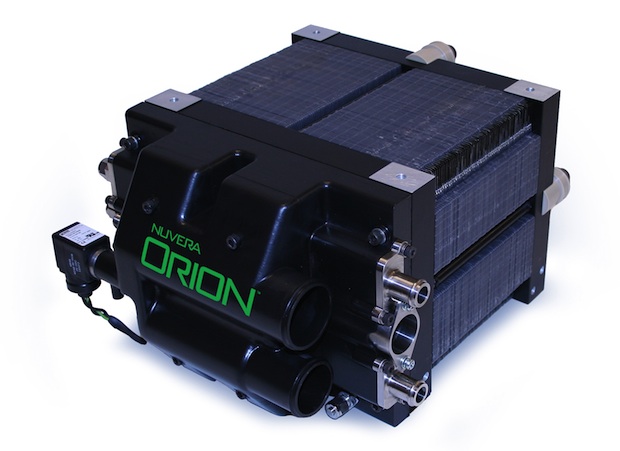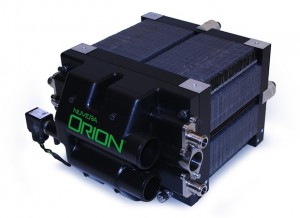
 Hydrogen fuel cell units from Nuvera Fuel Cells Inc. and another supplier will power truck refrigeration units under a DOE pilot program. (Credit: Nuvera.)
Hydrogen fuel cell units from Nuvera Fuel Cells Inc. and another supplier will power truck refrigeration units under a DOE pilot program. (Credit: Nuvera.)
The US is entering the Labor Day holiday weekend—summer’s unofficial last blast. Backyard grills will be fired up from coast to coast, and ice cream and other frozen treats undoubtedly will be popular as much of the country swelters under higher-than-normal heat and humidity.
Frozen foods, produce, and other grocery items that need to be kept cold during delivery are currently transported in trucks equipped with small auxiliary diesel units to power their onboard refrigeration systems. Trucking industry experts say approximately 300,000 such vehicles are currently on the road.
Replacing the auxiliary diesel units with fuel cells would save about 10 gallons of fuel per day for each truck while cutting diesel emissions and noise, according to a news release from the Department of Energy’s Pacific Northwest National Laboratory, Richland, Wash. The lab will partner with fuel cell suppliers Nuvera Fuel Cells Inc., Billerica, Mass., and Plug Power Inc., Albany, N.Y., to equip four delivery trucks in Texas, California, and New York with fuel cell-powered refrigeration units. According to the release, the trucks will be the first ever deployed with fuel cell technology to power their coolers.
“This is a great application for a fuel cell,” PNNL researcher and program manager Kriston Brooks says in the release. “A trailer refrigeration unit traditionally is powered by a small diesel engine or electric motor that drives compressors to provide cooling to the cargo. A fuel cell can potentially provide a clean, quiet, and efficient alternative by powering the electric motor.”
The two fuel cell suppliers will receive $650,000 each from DOE’s Office of Energy Efficiency and Renewable Energy, and will kick in financial support and labor for the two-year pilot program. They will work with established manufacturers of mobile refrigeration units to integrate their devices. Both companies are suppliers of PEM fuel cells rather than the solid oxide fuel cells we reported on earlier this week.
In addition to cutting diesel fuel consumption and emissions, use of fuel cell technology in this application is expected to create jobs in the energy sector and speed fuel cell adoption in industry. “In spite of their higher costs now, the higher efficiency and zero emissions from fuel cells are enough to convince many companies not to wait to implement this technology,” Brooks says. “Fuel cell products are already used widely in warehouses, and this project broadens their reach.”
The four fuel-cell powered trucks are slated to run a minimum of 400 hours at each demonstration site.
